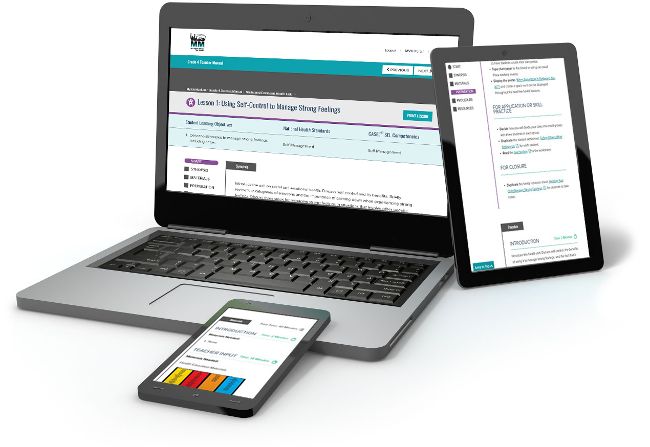Michigan Model + CASEL
The Michigan Model for Health™ program is a certified CASEL evidence-based curriculum that addresses the five core social emotional learning competencies. The MMH is rated a high-quality classroom-based SEL program for broad dissemination to schools across the United States and it is included in the CASEL Guide: Effective Social and Emotional Learning Programs.

MMH Meets CASEL's Program Research Criteria

The Michigan Model for HealthTM elementary curriculum is an approved CASEL SELect Program. The evaluation supported evidence of program effectiveness with the outcome of increased positive social behavior, reduced conduct problems, and substance abuse prevention.

The Michigan Model for HealthTM middle school curriculum is an approved CASEL Promising Program. The evaluation supported program effectiveness and found that compared to students in the comparison group students who participated in the program reported lower frequencies of using drugs and alcohol at post-test.
Explore Our Curriculum
MMH addresses critical health subjects across Pre-K to 12th grade levels with age-appropriate instructional activities and content. The skills-based lessons engage students to develop and practice positive health skills.
Improving Student Engagement through CASEL Competencies
The health standards, skills, and topics taught in Michigan Model for HealthTM (MMH) and the Social Emotional Learning (SEL) Competencies put forth by the Collaborative on Academic and Social Emotional Learning (CASEL) are tightly aligned. The five SEL competencies are foundational competencies students and adults need to achieve social and emotional learning mastery.

Collaborative for Academic, Social, and Emotional Learning (CASEL) Framework Wheel
- Self-Awareness - The ability to accurately recognize one’s own emotions, thoughts, and values and how they influence behavior. The ability to accurately assess one’s strengths and limitations, with a well-grounded sense of confidence, optimism, and a “growth mindset”.
- Self-Management - The ability to successfully regulate one’s emotions, thoughts, and behaviors in different situations – effectively managing stress, controlling impulses, and motivating oneself. The ability to set and work toward personal and academic goals.
- Social Awareness - The ability to take the perspective of and empathize with others, including those from diverse backgrounds and cultures. The ability to understand social and ethical norms for behavior and to recognize family, school, and community resources and supports.
- Relationship Skills - The ability to establish and maintain healthy and rewarding relationships with diverse individuals and groups. The ability to communicate clearly, listen well, cooperate with others, resist inappropriate social pressure, negotiate conflict constructively, and seek and offer help when needed.
- Responsible Decision-Making - The ability to make constructive choices about personal behavior and social interactions based on ethical standards, safety concerns, and social norms. The realistic evaluation of consequences of various actions, and a consideration of the well-being of oneself and others.
